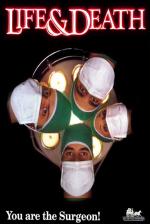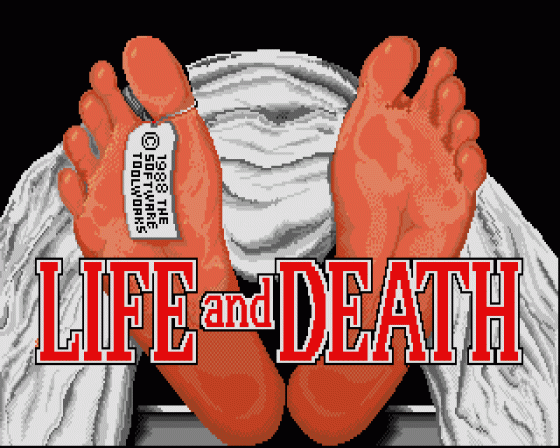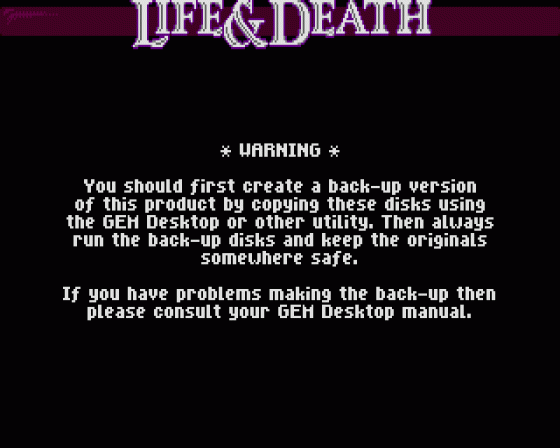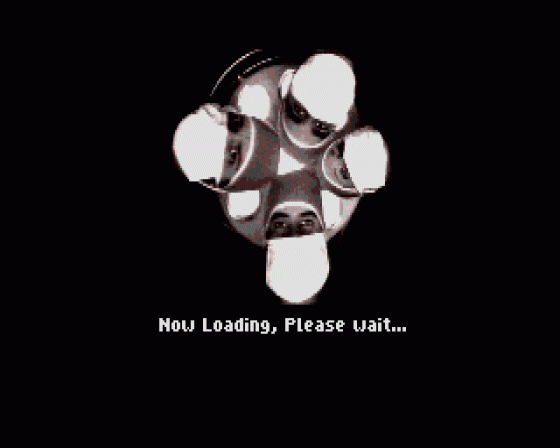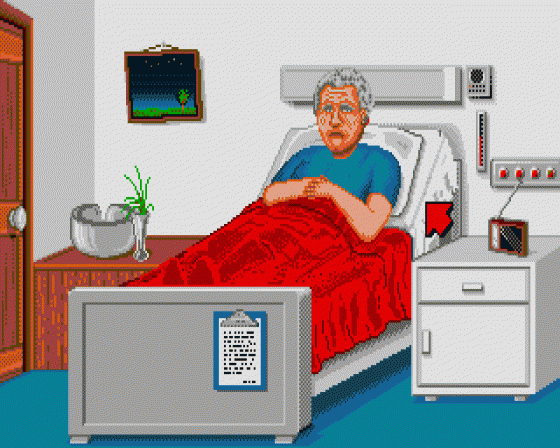
ST Format
 1st October 1991
1st October 1991
Categories: Review: Software
Author: Ed Ricketts
Publisher: The Software Toolworks
Machine: Atari ST
Published in ST Format #26
Life And Death
Of all the daft simulators attempted by enterprising software houses over the years, a medical sim must be one of the silliest. Seven years of training? Who needs it! Play Life And Death and you'll believe major surgery is simply a matter of prodding a few people and yanking their bits out.
Yes indeed, it's your chance to become a junior doctor at Toolworks General, a hospital specialising in - get this! - abdominal complaints. You're presented with a series of patients complaining of various but consistent symptoms, usually things like "abdominal pain", "dizziness" and other helpful descriptions. After an examination - abdominal area only - it's your decision what should happen to them. You have a choice between keeping them in for observation, giving them a dose of medication, x-raying them, giving them an ultra-scan, operating or referring them to a specialist.
At first it's difficult to know precisely when to do what, but as you get used to the patients' reactions to your examination, it becomes more or less second nature. Giving the wrong diagnosis means treatment could be fatal and you get a severe ticking off from your superior. But that's all. You can still get to Carry On Operating. When an operation does become necessary you need to follow the procedure precisely - the manual is a must here - and use the right injections sharpish if, for instance, the patient starts to suffer from fibrillation (or muscle spasms) during the operation.
Effects

A game of this ilk stands or falls on the nature of the graphics during the actual operation, and in this respect Life & Death doesn't do badly. Admittedly, the early stages don't look too realistic, but get to the appendix or aorta itself and the graphics really come into their own - the realism is almost gruesome. Elsewhere the graphics are clear and attractive, if not particularly well drawn. Sound is decidedly average, the only highlights being the digitised "Oohs" and "Aarghs" of the patients during an examination and The Big Machine That Goes Bleep in the operations.
Verdict
At first, Life & Death looks as though it could be great fun, simply because it's so different. But as you get used to the symptoms and treatments you realise there's actually very little to the game and it consists solely of the "extreme, treat, call for next patient" chain. Things do become a little more involved with operations, because until you know exactly where to cut and what to do they're very difficult, but once you've sussed them they, too, rapidly slide into just a dull routine.
For a game that's been so long arriving (it actually first appeared on other micros in 1988) there's precious little in it to surprise you. It comes with loads of impressive-sounding medical bumpf and even a pair of rubber gloves (!), presumably to try and justify the £30 price tag, but it doesn't do the trick.
Life & Death is fun to play for a few hours but the crucial ingredient, long-term playability, is sadly missing - interest palls after you've worked out the mechanics of the game. This is a real pity, because, with a bit more to do, this could have been a classic game.
At Toolworks General, It's Kill Or Cure, But Mainly Kill
Life in Toolworks General is pretty orderly, following a predictable round of examinations, lessons and the very occasional dead person. Here's a glimpse of what generally happens, from arriving at the hospital still wet behind the ears to becoming a cynical old slasher who's done in more people than Hannibal Lecter could even dream of.
- Right at the beginning of the game, in the implausibly-deserted reception area, you're asked by the permanently-grinning receptionist for your name. It's probably best to use a pseudonym at this early stage - that way it won't actually be you who's struck off.
- Before you can start hacking you need a few basic lessons, mainly on how to avoid lawsuits, the best way to silence screaming patients... that sort of thing. When you've skipped - sorry, inwardly digested - all the information, you're let loose on the patients.
- And here's the poor sod who's destined to be your first case. He's complaining of stomach paints and general dizziness. Definitely sounds like he should be opened up to me. Still, best go through the proper channels and have a quick look at 'im
- Click around the abdomen and see where he squeals. You soon get to know the tell-tale signs of appendicitis or an aneurysm. He seems to be in pain on his lower left side, so let's stick him under the X-ray machine and take a look.
- And what shows up? Er - nothing at all. That sort of pain can be caused by kidney stones, which would mean a boring referral, but since there's nothing awry on the scope it can only mean one thing. Time to cut! Get your gloves on...
- Operations are simple once you know where to slice. Opening the early layers is easy, as long as you keep an eye on the patient's heart, but once you start rummaging about in the appendix every cut counts. All it needs is one false swipe and...
- He's a gonner. Oh well, never mind. As the Chief Surgeon says, "Surgery is not easy, so keep trying." What a remarkably liberal policy they have in this hospital - good insurance cover and plenty of real live specimens for the trainees to practise on
Other Atari ST Game Reviews By Ed Ricketts
Scores
Atari ST Version| Graphics | 80% |
| Sound | 60% |
| Intelligence | 70% |
| Instant Appeal | 80% |
| Lastability | 40% |
| Overall | 72% |

